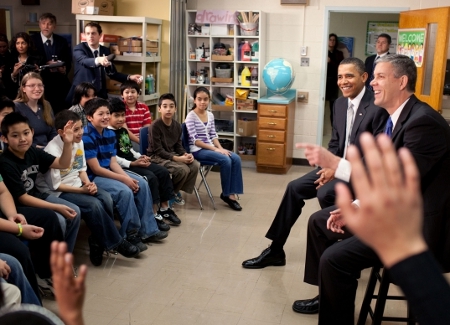The idea that you can use one source to gain all of your information is illogical. In what is supposed to be a rigorous learning environment, textbooks rarely are reliable enough to be used alone. In college, you have multiple texts for each class, on top of supplemental articles and readings from the professors. Why is it that in secondary education, textbooks are viewed as something holy, necessary, and indisputable. After my school administration insisted I dumb down my text, I made the conscious decision to have the students assassinate the textbook to their face.

This year my administration decided to get involved in the nuts and bolts of teaching, despite having less teaching experience than me. That says a lot. The situation reminds me of the time before I landed my first full-time teaching job, where I served as a para educator under some terribly uninspiring teachers. My administrator noticed I was using the AP book
American Pageant for my honors US History students, as opposed to
The Americans. He argued that
American Pageant was district approved for AP classes only, not honors MYP. I had used the textbook last year because IB teachers requested the students have more rigor in their text, so that they are ready for the IB program. I wasn't about to die for a textbook, after all, they are only one source, so I complied and asked my students to change their books. The only time the textbook is used, is for homework. It would be insulting to have the students read the textbook in class. So now the students read a textbook below their reading level, as opposed to above it. The one factor that was incontestable, and struck me as something administrators could not ignore, was the absurdity of my honors and sheltered students both using the same text. Not their problem apparently.
I have been focusing on the bias of sources, and and the value of understanding bias. So far we have assessed the bias of the History Channel and district tests. For my formal observation I created a lesson to compare the bias of the textbook with the reality shown in primary sources. I wanted to show administration that even the students could see the stupidity of the decision to switch texts. The topic I picked revolved around the Civil War, being our current unit of study. I could have chosen Columbus, unionization, progressive movements, WWI, immigration, or any time period or topic. The students examined the textbook, and another source I got from the Zinn Education Project. At the end I asked the students, what is the bias of the textbook, what is the bias of the other source? Which source do you find most valid, and give examples to support your reasoning? What is the value of knowing the bias of the textbook?
The students lit it up. "The textbook disencourages people taking action to make change. The textbook maintains the status-quo. The textbook is biased by minimizing the actions of common people. The

textbook tells us to wait for those in power to help, instead of helping ourselves." They nailed the bias. Administration watched, dumbstruck. "We need to know the bias of the textbook because we shouldn't believe everything we read. We need to know the bias so we know what our school is trying to teach us. The value of knowing the bias is to help us understand power." Those are all real quotes. I was surprised. Perhaps I created a class of revolutionaries. They saw
The Americans was hardly worth the paper it was printed on, and assassinated it. A valuable lesson in the teaching of history and its effects on how we see ourselves.
Afterward, my administration was in awe. They loved the lesson for obvious reasons. My reason for having them view the lesson was completely lost on them, it went right over their head. Dim people. I figured it wouldn't be smart to point that out the them, considering I'm still not tenured. That lesson helped win over the students completely. They are now fascinated with historiography, bias, and historical perspective. Students respect the textbook as much as I do, something we have in common against the continuous dumbing down of our curriculum, mandated from above.


 Three animals enjoying the last weeks without snow.
Three animals enjoying the last weeks without snow.





